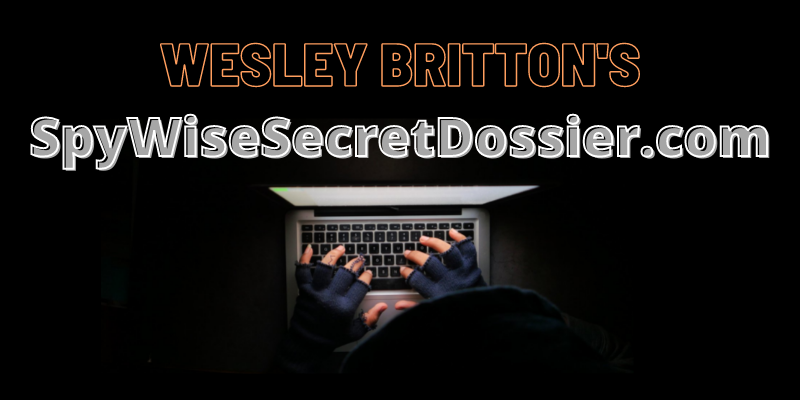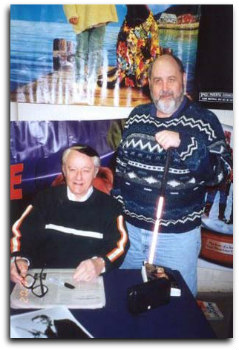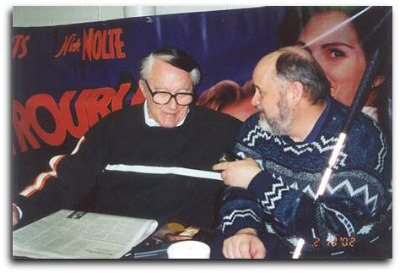
HOMEWesley Britton’s Books,
|
Spies on FilmSpies on Television & RadioSpies in History & LiteratureThe James Bond Files |
|
Spies on Television & Radio ~ A Conversation with Robert Vaughn
(November 22,1932 – November 16, 2016)
By Wesley Britton Note ~ This interview was originally posted March 2002 online on the “Channel D” list. Thus, it was conducted long before the flurry of interest in the British-produced Hustle, Vaughn’s “Tell them you mean business” insurance commercials, and discussions of a hoped-for Man from U.N.C.L.E. film, not to mention the long overdue DVD set, and of course, long before his untimely passing in November 2016. In 2002, my purpose was to ask Vaughn about his lesser-known spy TV series like The Protectors and The A-Team, along with his thoughts on the longevity of U.N.C.L.E., so these are the main points covered below. Fans of U.N.C.L.E. might enjoy looking over the other postings here including articles on MFU comics, a movie script never produced, a collector’s guide, and a review of The Protectors on DVD. For much more information, see my book Spy Television (Praeger Publishers, 2004) for which this interview was arranged. (December 2021) 
Actor Robert Vaughn and Wes Britton at the Montgomery Fairgrounds Antique Show, Gaithersburg, MD, February 2002. On February 9th, 2002, I gave myself a mission and gratefully accepted it. My mission: to attend the Montgomery Fairgrounds Antique Show in Gaithersburg, Maryland, and interview my childhood hero – actor Robert Vaughn, AKA Napoleon Solo, the “Man From U.N.C.L.E.” I’ve had harder missions. Arriving at the autograph tables early in the morning, I saw him – Robert Vaughn, the walking definition of secret agent elegance and style. He was sitting between two lovely actresses also there to be seen and greet fans. On Vaughn’s left sat Karen Black, star of countless films and TV shows of the 1970s and beyond. On his right sat Linda Harrison, best known for her role as Nova, Charlton Heston’s love interest in the first two Planet of the Apes epics. Despite their distracting charms, it was Vaughn I had come to see, and he quickly agreed to speak with me over the noon hour. For several hours before our conversation, my wife Betty and I shopped in the four rooms of collectibles, looking carefully for U.N.C.L.E. memorabilia for Napoleon, er, Robert to sign. Amidst all the carefully organized boxes and displays of Baby Boom nostalgia, I found it – the ideal souvenir for the occasion. One dealer sold me a vintage 1966 16 magazine featuring a spread called “The Life of Robert Vaughn in 50 Photos.” What could be more perfect – the life of the star of U.N.C.L.E., The A-Team, and countless films and TV appearances signed by the man himself? I should have known better. When I returned to the autograph table for our talk, my wife showed Vaughn the magazine. His excitement was obvious as he looked over the pictures. With tones revealing his own nostalgia for times past he said, “I’ve never seen this before. I was so much taller then. There’s my high school sweetheart.” Of course, my good-hearted spouse had to say it – “Why don’t you give it to him?” “I was thinking about that. . . ” muses I, aloud. But before my thought had jelled, the magazine disappeared from view faster than any spy’s conjuring trick. Turning to me, Vaughn said, “So what is it you’d like to ask me?” Clearly, I’d paid my price of admission. Of course, I’d thought out just what I wanted to ask, as I was researching information for my book, Spy Television, then a manuscript in search of a publisher. Being a lifelong U.N.C.L.E. fan, I knew Vaughn’s ex-partner, David McCallum, had become so tired of discussing his role as Illya Kuryakin in the show, he refused to answer any more questions about the old days. While Vaughn has always been more talkative about his years in the forefront of American popular culture, I suspected few questions I could ask hadn’t been asked and answered many times before. So I started by inquiring into why Vaughn left the States after his most successful series had been cancelled in 1968 – a subject of much conjecture by fans on ongoing and very lively online list-serves devoted to what was once the most influential series on television. Many aficionados had speculated Vaughn»s choice to leave America was based on the political problems of the era, notably the assassination of Vaughn’s personal friend, Robert F. Kennedy. Was this so? It was. Vaughn said firmly, “I was working in Czechoslovakia when the Russians invaded in August of 1968, and that, combined with the Vietnam War, and the election of Richard Nixon, I decided I’d spend some time outside of the United States. For the next four years, almost five years, I was based in London and did television series for three years, various films in England and on the Continent and in Italy.’ 
Wes interviews “The Man from U.N.C.L.E.”. At that time, it was widely reported Vaughn planned to leave acting to enter politics. Was this true? “Well, I actually hadn’t talked about it, but the fan magazines had talked about it. I never had any personal interest myself. I was basically opposing the war which was not a political issue to me. It was an international, humanity issue.” During this self-imposed exile, Vaughn starred as Harry Rule in a little-known series called The Protectors, a 30-minute show later syndicated in the U.S., from 1972 to 1973. As Vaughn had said he didn’t want to do any further television series after U.N.C.L.E.,, I asked how this came about. He told me Sir Lew Grade, who ran all of Britain’s commercial programming at that time, called his agent in England and asked if Vaughn would be interested in doing a spy show there. &rlquo;I said I wasn’t very interested,” he told me, “and then they said, ‘Well, it’s only a half-hour show, you’d only be here one year,’ and they offered a pretty good deal. I didn»t realize that in England, it took them five to six to seven days to shoot a half-hour show whereas in America it would take only three days. I wound up doing a second season, so I was there almost three years.” The Protectors wasn’t a show the actor was especially proud of. “I wasn’t too happy with the quality of the stories, but I had a wonderful time. I lived in London. Every weekend we spent in some place in England, Ireland, or Scotland. We did a lot of filming, actually, on the continent in Spain, Italy, Germany, Denmark, and just about every country available in Europe.” After his return to the States, Vaughn’s acting career continued in earnest, with both starring roles and guest appearances in films and television series such as The Magnificent Seven, Superman III, Kung Fu: The Legend Continues, Columbo, Law and Order, and one episode of Diagnosis: Murder which featured three other TV spies from the ‘60s, Patrick Macnee, Barbara Bain, and Robert Culp. But one starring role didn’t make it. “I did a quick series that didn’t last very long called Emerald Point.” Starring Dennis Weaver, the series “was done by the same people who did Dynasty and Dallas and it was kind of supposedly a show with that kind of orientation that took place in the Navy. It only lasted half a season.” In 1985, Vaughn starred as General Hunt Stockwell, a role designed to boost the ratings of the once-popular series The A-Team, best remembered for the presence of Mr. T and his catch-phrase, “I pity the fool.” But after dropping ratings, Vaughn said he was asked to come in at the request of an old friend. “The guy that produced The A-Team, his name is John Ashley, he’s since died, he was an actor. We were both young actors in our twenties when we came to Hollywood . . . He remembered me from our early days.” (For a time, John Ashley was married to Deborah Walley, with whom he appeared in the Frankie Avalon/Annette Funicello Beach Party movies.) The show lasted only one more season, but during that year, one memorable episode teamed Vaughn with his old pal, David McCallum. In that adventure, “The Say U.N.C.L.E. Affair” (first broadcast on Oct. 31, 1986), McCallum played a former partner of General Stockwell’s who’d become a traitor and an agent for the Red Chinese. What was it like, I wondered, for the two friends to reunite? “We had a lot of fun. We keep in touch. David lives in New York City, I live in Connecticut about an hour north of New York City so we’re in touch from time to time on the phone and personally.” We chatted about the ongoing interest in what might seem to non-fans as a show long ago relegated to TV history – of course, I mean The Man from U.N.C.L.E.. Despite its few appearances on the small screen since its first run from 1964 to1968, five internet groups are devoted to the series, a detailed “web ring” of U.N.C.L.E. sites grow seemingly each month, and an ongoing series of CD albums of original soundtracks continue to sell well. After 9/11, much discussion revolved around the fact that the war on terror would likely require just such an international organization as U.N.C.L.E. (The United Network Command for Law and Enforcement). What, I asked Vaughn, is the reason The Man from U.N.C.L.E. is still interesting to baby boomers now in their fifties? “I think it relates definitely to the ongoing success of the James Bond pictures,” Vaughn replied. “Obviously, they’re still making them and still making a lot of money. It is generally that genre that U.N.C.L.E. was supposed to emulate, which was an international roguish kind of spy who operates around the world with a lot of attractive women, and I guess that’s why it’s still going on. ‘Cause there were a lot of attractive women in the ‘60s that are still on film. They may date but not the film.” Knowing Vaughn had contributed to a dissertation by Cynthia Walker on U.N.C.L.E. at Rutgers University, I asked his thoughts on the meaning of such scholarly interest in his show. “I don’t know what it all meant, philosophically or intellectually. I know it was good fun for us to do and good fun for people to see. I guess I’ll wait for Cynthia Walker’s report to find out the deeper meaning of the whole thing.” Currently, Vaughn is working on his autobiography which will be completed “when the autobiographer, meaning me, puts his butt in a chair long enough to wrap it up.” Meanwhile, The Man from U.N.C.L.E. looks like it will be coming to the big screen, and Vaughn, like his buddy David McCallum now starring on NCIS, will be in a new series of his own in 2004. The file on Robert Vaughn is far from complete. Photographs from the collection of Wesley Britton. |